经典阅读:李斯特《政治经济学的国民体系》
读《政治经济学的国民体系》

读《政治经济学的国民体系》一、全书思路对欧洲各主要政治势力的兴衰成败进叙述、分析、归纳,指出了提高一国竞争力所必备的两点:1,统一、稳定、团结、自由的主权国家。
2,先进的工业生产力。
随即从理论层面对这两点加以论述,提出国家经济学概念和生产力理论,并驳斥了斯密的自由贸易主张和世界经济学的论点,同时指出了实施关税保护政策以全力发展本国工业的必要性。
最后对历史上相关学派和各主要国家曾经实施的经济政策予以评述,以巩固自己的观点。
二、主要论点国家经济学:指出国家经济与世界经济的差别,各国均有各自无从抹煞的经济发展水平、历史特点和不同利益,并在此基础上提出了各国经济发展必经的五个阶段,,各国只有共同达到他们可能达到的阶段,并在一个持久和平的世界联盟范围内,国际间的自由贸易菜对所有国家有利。
生产力理论:生产力包括物质资本和精神资本,财富的生产力比之财富更加重要,生产力的发展主要来自本国工业的强大,所以要已采取关税政策保护和发展本国生产为优先。
三、全书脉络第一编历史(1-10)第一章意大利人:以威尼斯盛衰之例指出:1,国别竞争要国家的统一。
2自由贸易政策需随时局转换而变更。
第二章汉撒商人:以汉撒商人重商轻本的云最方式最终衰落违例,指出发展生产力的重要性。
第三章荷兰人:指出一国强大民族性的重要性,单靠工商业是无法是国家摆脱逆境的。
第四章英国人:分析英国人称霸原因:1,适时的政治政策。
2,工业化的传承。
第五章西班牙人与葡萄牙人:以两国的衰败违例,反证宗教、政治自由是工商业深根发芽的土壤。
第六章法国人:工业的发展对一国农业的促进。
第七章德国人:指出德国工业的发展呼唤国家的统一、国内市场的自由顺畅和统一的对外关税。
第八章俄国人:指出了国民的团结和稳定的政治环境的积极作用。
第九章美国人:指出工业立国是更本,农业国是无法于工业国竞争的。
第十章历史教训:对上文史实的再归纳总结。
第二编理论(11-27)第一部分(11-16)论述国家经济学的有关理论。
理论篇(保护贸易论)

国际贸易学分章节练习及答案(二)理论部分4、保护贸易理论一、单选题1.“财富的生产力比之财富本身,不晓得要重要多少倍”,这句话出自( )。
A.大卫·李嘉图 B.亚当·斯密 C.弗里德斯希·李斯特 D.保罗·克鲁格曼2.世界贸易组织将( )作为允许发展中国家对某些产业进行保护的依据。
A.幼稚产业保护理论 B.重商主义 C.战略性贸易政策理论 D.贸易乘数理论3.保护贸易的倡导者李斯特承认( )是贸易保护的“唯一成立的理由”。
A.幼稚产业保护理论 B.重商主义C.战略性贸易政策 D.贸易乘数理论4.以下哪个不是凯恩斯指出的顺差过大的影响?( )A.物价下降 B.货币供给过多 C.利率下降 D.资本外流5.战略性贸易政策与幼稚产业保护理论本质的区别是( )。
A是否存在国家干预 B.是否存在规模经济C.产品是否存在多样化 D.是否在限制进口的同时又促进出口6.( ),战略性贸易政策效果越好。
A.产业准人程度越高 B.政府信息越完全C.道德风险越大 D.市场竞争性越强7.李斯特在《政治经济学的国民体系》中判断当时美国和德国处于( )。
A.畜牧阶段 B农业阶段 C.农工业阶段 D.农工商业阶段8.幼稚产业保护理论提出保护幼稚产业的措施是( )。
A.关税 B.配额 C.进口许可证 D.产品技术标准9.布兰德一斯宾瑟模型中,在对方企业不发生相应变化的情况下,一国政府对其企业的生产补贴会导致( )。
A.被补贴企业利润提高 B.未实行补贴国家福利改善C.未实行补贴国家企业产出减少 D.未实行补贴国家利润上升10.战略性贸易政策理论之所以被冠以“战略”,是因为( )。
A.该政策要保护的产业对该国有至关重要的意义B.该政策要保护的企业对该国有至关重要的意义C.政府在制定该贸易政策时会把对手国的反应考虑在内D. 企业在制定生产策略时会把对手的反应考虑在内11.强调贸易保护对促进就业具有积极作用的是( )。
政治经济学的国民体系读后感
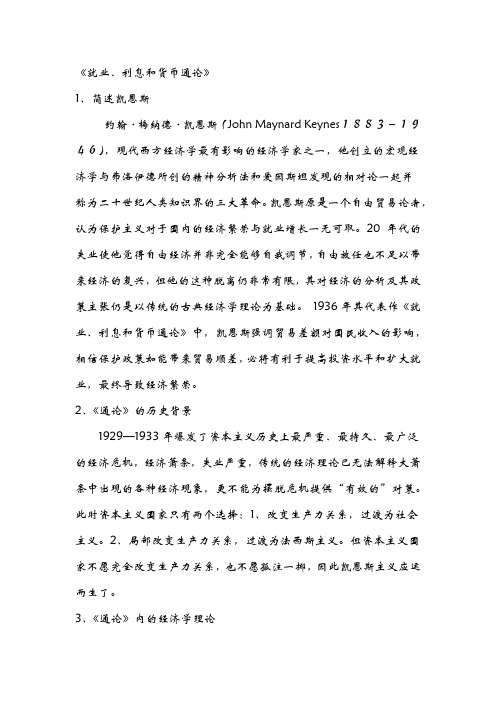
《就业、利息和货币通论》1、简述凯恩斯约翰〃梅纳德〃凯恩斯(John Maynard Keynes1883-1946),现代西方经济学最有影响的经济学家之一,他创立的宏观经济学与弗洛伊德所创的精神分析法和爱因斯坦发现的相对论一起并称为二十世纪人类知识界的三大革命。
凯恩斯原是一个自由贸易论者,认为保护主义对于国内的经济繁荣与就业增长一无可取。
20 年代的失业使他觉得自由经济并非完全能够自我调节,自由放任也不足以带来经济的复兴,但他的这种脱离仍非常有限,其对经济的分析及其政策主张仍是以传统的古典经济学理论为基础。
1936年其代表作《就业、利息和货币通论》中,凯恩斯强调贸易差额对国民收入的影响,相信保护政策如能带来贸易顺差,必将有利于提高投资水平和扩大就业,最终导致经济繁荣。
2、《通论》的历史背景1929—1933年爆发了资本主义历史上最严重、最持久、最广泛的经济危机,经济萧条,失业严重,传统的经济理论已无法解释大萧条中出现的各种经济现象,更不能为摆脱危机提供“有效的”对策。
此时资本主义国家只有两个选择:1、改变生产力关系,过渡为社会主义。
2、局部改变生产力关系,过渡为法西斯主义。
但资本主义国家不愿完全改变生产力关系,也不愿孤注一掷,因此凯恩斯主义应运而生了。
3、《通论》内的经济学理论(1)有效需求和就业理论:凯恩斯的就业理论是以实现充分就业为目标的,他的逻辑起点是“有效需求原理”。
,指出现实经济生活中不仅存在着“自愿失业”、“摩擦失业”,而且还存在着“非自愿失业”。
这种小于充分就业的均衡是通常存在的,造成这一情况的原因在于“有效需求不足”。
所谓“有效需求”,按凯恩斯的解释,就是商品的总供给和总需求达到均衡状态时的总需求,即“总需求函数与总供给函数相交点之值”。
总就业量决定于总需求,失业是由总需求不足造成的。
(2)三大心理规律:第一,边际消费倾向规律边际消费倾向则是指增加的收入量和增加的消费量之间的比例关系。
德国历史学派 李斯特
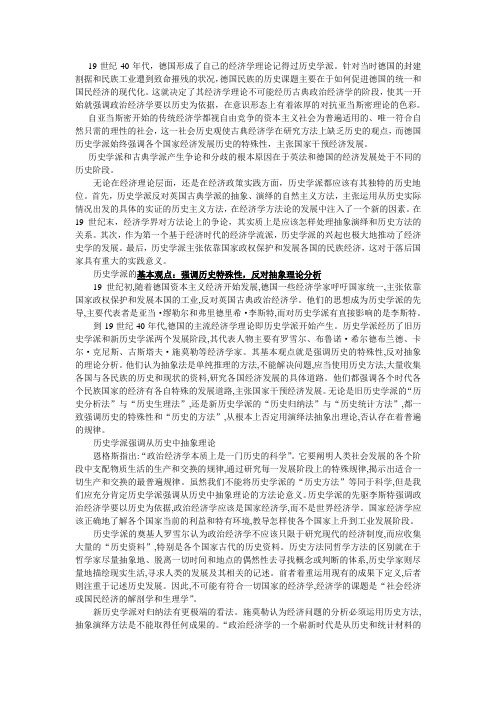
19世纪40年代,德国形成了自己的经济学理论记得过历史学派。
针对当时德国的封建割据和民族工业遭到致命摧残的状况,德国民族的历史课题主要在于如何促进德国的统一和国民经济的现代化。
这就决定了其经济学理论不可能经历古典政治经济学的阶段,使其一开始就强调政治经济学要以历史为依据,在意识形态上有着浓厚的对抗亚当斯密理论的色彩。
自亚当斯密开始的传统经济学都视自由竞争的资本主义社会为普遍适用的、唯一符合自然只需的理性的社会,这一社会历史观使古典经济学在研究方法上缺乏历史的观点,而德国历史学派始终强调各个国家经济发展历史的特殊性,主张国家干预经济发展。
历史学派和古典学派产生争论和分歧的根本原因在于英法和德国的经济发展处于不同的历史阶段。
无论在经济理论层面,还是在经济政策实践方面,历史学派都应该有其独特的历史地位。
首先,历史学派反对英国古典学派的抽象、演绎的自然主义方法,主张运用从历史实际情况出发的具体的实证的历史主义方法,在经济学方法论的发展中注入了一个新的因素。
在19世纪末,经济学界对方法论上的争论,其实质上是应该怎样处理抽象演绎和历史方法的关系。
其次,作为第一个基于经济时代的经济学流派,历史学派的兴起也极大地推动了经济史学的发展。
最后,历史学派主张依靠国家政权保护和发展各国的民族经济,这对于落后国家具有重大的实践意义。
历史学派的基本观点:强调历史特殊性,反对抽象理论分析19世纪初,随着德国资本主义经济开始发展,德国一些经济学家呼吁国家统一,主张依靠国家政权保护和发展本国的工业,反对英国古典政治经济学。
他们的思想成为历史学派的先导,主要代表者是亚当·缪勒尔和弗里德里希·李斯特,而对历史学派有直接影响的是李斯特。
到19世纪40年代,德国的主流经济学理论即历史学派开始产生。
历史学派经历了旧历史学派和新历史学派两个发展阶段,其代表人物主要有罗雪尔、布鲁诺·希尔德布兰德、卡尔·克尼斯、古斯塔夫·施莫勒等经济学家。
政治经济学的国民体系第4章

二、资本的总公式及其矛盾
二、资本的总公式及其矛盾
资本的总公式表明,资本在运动中、在流通 中发生了价值的增殖。价值增殖固然是资本 的本质属性,然而,资本在流通中产生价值 增殖却是同商品、价值、货币的性质,同商 品经济的价值规律相矛盾的。
二、资本的总公式及其矛盾
在流通领域,不管是等价交换,还是不等价 交换,都不能产生价值增殖。等价交换自然 不会发生价值增殖。不等价交换,无论是贱 买还是贵卖,也都不产生价值增殖。
第三节 剩余价值生产的基本方法
第三节 剩余价值生产的基本方法
一、绝对剩余价值生产 二、相对剩余价值生产 三、资本主义管理的两重性
一、绝对剩余价值生产
一、绝对剩余价值生产
绝对剩余价值生产方法,是指在必要劳动时间为一定的条件下, 通过延长工作日以增加剩余劳动时间来增加剩余价值量的方法。 假定工人的必要劳动时间为6小时,工作日长度为12小时,则剩 余劳动时间为6小时,剩余价值率为100%(6小时/6小时)。如 果必要劳动时间不变而资本家把工作日延长到15小时,则剩余 劳动时间便由6小时增加到9小时,剩余价值率提高到150%(9小 时/6小时)。
二、工资的形式
二、工资的形式
资本主义工资的基本形式有两种, 资本主义工资的基本形式有两种,一是计时 工资,另一是计件工资。 工资,另一是计件工资。
计时工资是按照工人的劳动时间来支付的工资。 计时工资是按照工人的劳动时间来支付的工资。 是按照工人的劳动时间来支付的工资 由于计量劳动时间的单位不同, 由于计量劳动时间的单位不同,计时工资又有日工 资、月工资、周工资、小时工资等不同的具体形式。 月工资、周工资、小时工资等不同的具体形式。 计件工资是资本家按照工人在一定时间内所完 计件工资是资本家按照工人在一定时间内所完 成的产品数量或作业量支付的工资。 成的产品数量或作业量支付的工资。
30部必看的经济学著作

30部必看的经济学著作第1部《经济表》弗朗斯瓦·魁奈(法国1694—1774)第2部《国富论》亚当·斯密(英国1723—1790)第3部《人口原理》托马斯·罗伯特·马尔萨斯(英国1766—1834)第4部《政治经济学概论》让·巴蒂斯特·萨伊(法国1767—1832)第5部《政治经济学及赋税原理》大卫·李嘉图(英国1772—1823)第6部《政治经济学新原理》西蒙·德·西斯蒙第(法国1773—1842)第7部《政治经济学的国民体系》弗里德利希·李斯特(德国1789—1846)第8部《政治经济学原理》约翰·斯图亚特·穆勒(英国1806—1873)第9部《资本论》卡尔·马克思(德国1818—1883)第10部《政治经济学理论》威廉·斯坦利·杰文斯(英国1835—1882)第11部《国民经济学原理》卡尔·门格尔(奥地利1840—1921)第12部《纯粹政治经济学纲要》里昂·瓦尔拉斯(法国1834—1910)第13部《资本与利息》欧根·冯·庞巴维克(奥地利185l一1914)第14部《经济学原理》阿弗里德·马歇尔(英国1842—1924)第15部《利息与价格》克努特·维克塞尔(瑞典1851—1926)第16部《财富的分配》约翰·贝茨·克拉克(美国1847—1938)第17部《有闲阶级论》托尔斯坦·本德·凡勃伦(美国1857—1929)第18部《经济发展理论》约瑟夫·阿罗斯·熊彼特(奥地利1883—1950)第19部《福利经济学》阿瑟·赛西尔·庇古(英国1877—1959)第20部《不完全竞争经济学》琼·罗宾逊(英国1903—1983)第21部《就业、利息和货币通论》约翰·梅纳德·凯恩斯(英国1883—1946)第22部《价值与资本》约翰·理查德·希克斯(英国1904—1989)第23部《通往奴役之路》哈耶克(奥地利1899—1992)第24部《经济学》保罗·萨缪尔森(美国1915一)第25部《丰裕社会》约翰·肯尼斯·加尔布雷斯(美国1908—)第26部《经济成长的阶段》沃尔特·罗斯托(美国1916—)第27部《人力资本投资》西奥多·威廉·舒尔茨(美国1902—1998)第28部《资本上义与自由》米尔顿·弗里德曼(美国1912—)第29部《经济学》约瑟夫·斯蒂格利茨(美国1943—) 第30部《经济学原理》格里高利·曼昆(美国1958—)。
政治经济学的国民体系

2013-11-21
• 李斯特认为,在这个世界上,各个国家之间的 利益是对立的,只要各个国家之间的经济发 展水平不平衡,各国利益相冲突,发达国家对 落后国家的零和博弈就存在,各国之间的利 益分配就将出现严重对抗。要实现从零和 博弈到双赢博弈,就应该使各国站在同一经 济发展水平上,公平竞争。在没有达到这个 目标之前,落后国家要防止赢者通吃的零和 博弈,只有实现工业化。要实现工业化,落后 国家就必须运用正确的战略实现赶超,有限 保护与国家推动则必不可少。
2013-11-21 16 第5章西班牙和葡萄牙人• 西班牙人与葡萄牙人凭借新航线的发现带来的时来 运转,迅速 积聚了大量财富西班牙具备了实现富强 所必须的全部因素,但是顽固与专制联手把强大的 民族精神窒息了;葡萄牙在厄勒塞拉伯爵领导下, 曾试图发展制造业,初期效果令人震惊,但厄勒塞 拉伯爵去世后,《麦修恩条约》的缔结,使英国制 成品迅速充斥了葡萄牙市场。可与同葡萄牙签订的 《麦修恩条约》相提并论并值得一提的是 英国于 1713年与西班牙签订的《阿西安托条约》,按照该 条约,英 国人有权每年把一定数量的非洲黑人运往 西属美洲,每艘船每年可 访问波托贝洛港一次,这 就为他们向这些国家走私大量货物提供了 一个千载 难逢的机会。
2013-11-21 13
第3章荷兰人
• 良好的地理及气候条件、与汉萨同盟的贸易得到的 资本积累、以及国家统一与自由精神公民精神,使 得荷兰成为海上霸主。但是,荷兰人没有看到更为 深远的政治才能,他们没有意识到,只有建立在强 大的民族主义基础之上,得到伟大的民族精神的支 持,他们已经获得的霸主地位才能得以维持。当别 的民族大国兴起时,荷兰这样的小国必然衰落。荷 兰在国外贸易方面丧失了这样大的部分以后,结果 与汉萨城市及威尼斯过去的遭遇如出一辙——大量 的物质与精神资本这时在荷兰已感到无用武之地, 就以移民或贷款形式转向别的国家,这些国家这时 已从荷兰手里取得了荷兰昔日占有的优越地位。
如何摆脱“永久打工者”的困境?——重读李斯特的《政治经济学的国民体系》
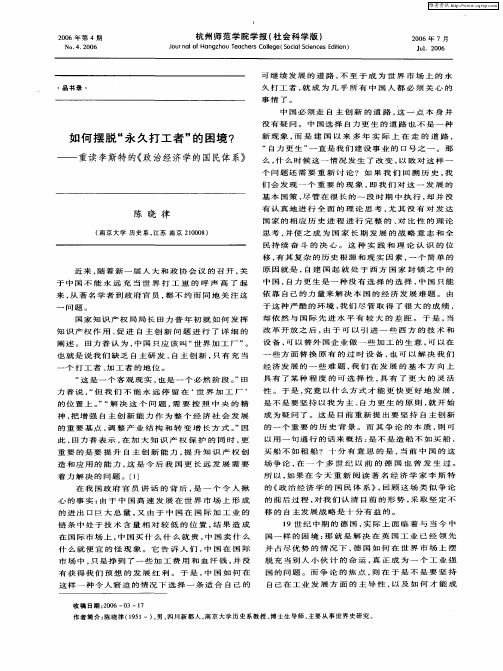
问题 。
国家 知 识 产 权 局 局 长 田 力 普 年 初 就 如 何 发 挥 知 识 产 权 作 用 、 进 自 主 创 新 问 题 进 行 了 详 细 的 促 阐 述 。 田 力 普 认 为 , 国 只 应 该 叫 “ 界 加 工 厂 ”。 中 世 也 就 是 说 我 们 缺 乏 自 主 研 发 、 主 创 新 , 有 充 当 自 只
陈 晓 律
( 京大学 历史系 , 苏 南京 200 ) 南 江 10 8
有 认 真 地 进 行 全 面 的 理 论 思 考 , 其 没 有 对 发 达 尤 国家 的相应 历史 进 程 进 行 完 整 的 、 比性 的 理论 对
思 考 , 使 之 成 为 国 家 长 期 发 展 的 战 略 意 志 和 全 并
一
原 因 就 是 , 建 国 起 就 处 于 西 方 国 家 封 锁 之 中 的 自 中 国 , 力 更 生 是 一 种 没 有 选 择 的 选 择 , 国 只 能 自 中
依 靠 自 己 的 力 量 来 解 决 本 国 的 经 济 发 展 难 题 。 由
于 这 种 严 酷 的 环 境 , 们 尽 管 取 得 了 很 大 的成 绩 , 我 却 依然 与 国 际先 进 水 平 有 较 大 的 差 距 。 于是 , 当
20 0 6年 7月
J1 0 6 u .2 0
可 继 续 发 展 的 道 路 , 至 于 成 为 世 界 市 场 上 的 永 不
・
品书录 ・
久 打 工 者 , 成 为 几 乎 所 有 中 国 人 都 必 须 关 心 的 就 事情 了 。
中 国 必 须 走 自 主 创 新 的 道 路 , 一 点 本 身 并 这
政治经济学的国民体系
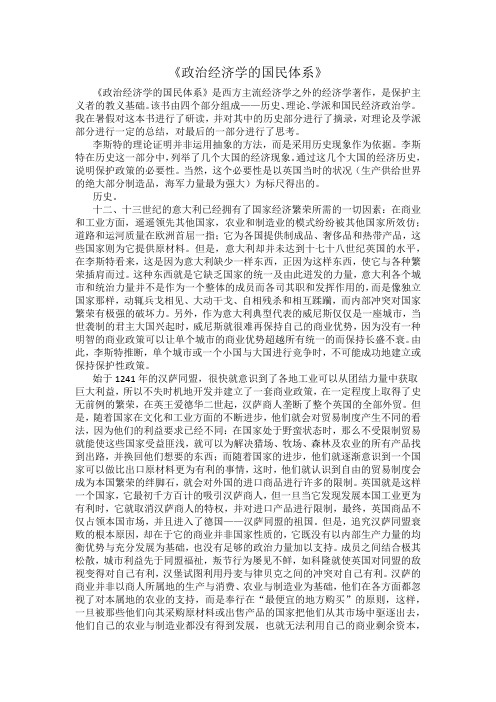
《政治经济学的国民体系》《政治经济学的国民体系》是西方主流经济学之外的经济学著作,是保护主义者的教义基础。
该书由四个部分组成——历史、理论、学派和国民经济政治学。
我在暑假对这本书进行了研读,并对其中的历史部分进行了摘录,对理论及学派部分进行一定的总结,对最后的一部分进行了思考。
李斯特的理论证明并非运用抽象的方法,而是采用历史现象作为依据。
李斯特在历史这一部分中,列举了几个大国的经济现象。
通过这几个大国的经济历史,说明保护政策的必要性。
当然,这个必要性是以英国当时的状况(生产供给世界的绝大部分制造品,海军力量最为强大)为标尺得出的。
历史。
十二、十三世纪的意大利已经拥有了国家经济繁荣所需的一切因素:在商业和工业方面,遥遥领先其他国家,农业和制造业的模式纷纷被其他国家所效仿;道路和运河质量在欧洲首屈一指;它为各国提供制成品、奢侈品和热带产品,这些国家则为它提供原材料。
但是,意大利却并未达到十七十八世纪英国的水平,在李斯特看来,这是因为意大利缺少一样东西,正因为这样东西,使它与各种繁荣插肩而过。
这种东西就是它缺乏国家的统一及由此迸发的力量,意大利各个城市和统治力量并不是作为一个整体的成员而各司其职和发挥作用的,而是像独立国家那样,动辄兵戈相见、大动干戈、自相残杀和相互蹂躏,而内部冲突对国家繁荣有极强的破坏力。
另外,作为意大利典型代表的威尼斯仅仅是一座城市,当世袭制的君主大国兴起时,威尼斯就很难再保持自己的商业优势,因为没有一种明智的商业政策可以让单个城市的商业优势超越所有统一的而保持长盛不衰。
由此,李斯特推断,单个城市或一个小国与大国进行竞争时,不可能成功地建立或保持保护性政策。
始于1241年的汉萨同盟,很快就意识到了各地工业可以从团结力量中获取巨大利益,所以不失时机地开发并建立了一套商业政策,在一定程度上取得了史无前例的繁荣,在英王爱德华二世起,汉萨商人垄断了整个英国的全部外贸。
但是,随着国家在文化和工业方面的不断进步,他们就会对贸易制度产生不同的看法,因为他们的利益要求已经不同:在国家处于野蛮状态时,那么不受限制贸易就能使这些国家受益匪浅,就可以为解决猎场、牧场、森林及农业的所有产品找到出路,并换回他们想要的东西;而随着国家的进步,他们就逐渐意识到一个国家可以做比出口原材料更为有利的事情,这时,他们就认识到自由的贸易制度会成为本国繁荣的绊脚石,就会对外国的进口商品进行许多的限制。
李斯特对经济学说史的贡献应予肯定

不生产产品, 但却是未来生产力的培养者, 其“ 生产性” 比单纯体力劳动者“ 生产性”大得多, 应把教师劳
动视为生产性劳动。李斯特以西班牙官僚、贵族横征暴虐和“ 心理上的偏言、盲从、不实事求是”给这个巨
例。斯密未能看到机器大工业的巨大威力, 他虽然克服了重农主义只把农业劳动看作生产性劳动的错
误, 但他仍未完全摆脱重农主义影响, “ 认为农业所需要的技巧多于商业。” ⑩是最有生产性的行业。生活
在英国产业革命完成时期的李斯特则不同, 他目睹和经历了机器大工业对英国农业的技术变革, 商业繁
荣, 自然力征服以及对人们智力、观念、社会政治制度所产生的深刻影响, 提出以工业进步为中心的国家
出发, 向斯密、李嘉图经济思想提出挑战, 创立了与英法古典主义相对立的学说体系。首先, 关于经济学
研究对象。李斯特主张经济学研究应从各国实际出发, 探讨单个国家的经济发展。经济学研究的目的是
怎样使国家财富、生产力增
一
民, 从经济落后状态发展成为先进强国。就德国而言, 资本主义工业起步比英
国晚半个世纪, 无论是两国历史条件还是经济水平都相差悬殊。如果把斯密阐述的一般原则作为教条照
却惯以他反对古典经济学的某些论述, 断言李斯特在古典学派达到的水平上退步, 没有任何建树。从而
抹煞了他对经济学说史的创新和贡献。为了公正、客观地评价李斯特经济思想, 确立他在资产阶级经济
学中的地位, 有必要重新挖掘其思想精髓, 充分肯定他对经济学说史的贡献。
一、开拓了经济学研究的新领域
当古典经济学在资产阶级经济学领域占统治地位并开始输入德国时, 李斯特从德国落后经济实际
经典阅读:李斯特《政治经济学的国民体系》
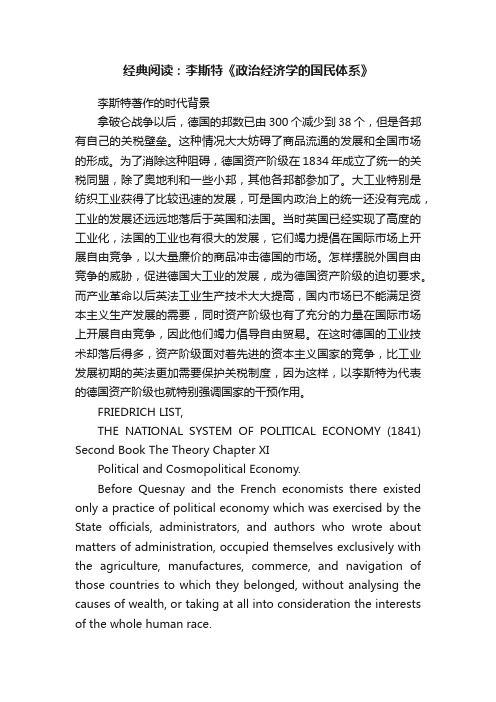
经典阅读:李斯特《政治经济学的国民体系》李斯特著作的时代背景拿破仑战争以后,德国的邦数已由300个减少到38个,但是各邦有自己的关税壁垒。
这种情况大大妨碍了商品流通的发展和全国市场的形成。
为了消除这种阻碍,德国资产阶级在1834年成立了统一的关税同盟,除了奥地利和一些小邦,其他各邦都参加了。
大工业特别是纺织工业获得了比较迅速的发展,可是国内政治上的统一还没有完成,工业的发展还远远地落后于英国和法国。
当时英国已经实现了高度的工业化,法国的工业也有很大的发展,它们竭力提倡在国际市场上开展自由竞争,以大量廉价的商品冲击德国的市场。
怎样摆脱外国自由竞争的威胁,促进德国大工业的发展,成为德国资产阶级的迫切要求。
而产业革命以后英法工业生产技术大大提高,国内市场已不能满足资本主义生产发展的需要,同时资产阶级也有了充分的力量在国际市场上开展自由竞争,因此他们竭力倡导自由贸易。
在这时德国的工业技术却落后得多,资产阶级面对着先进的资本主义国家的竞争,比工业发展初期的英法更加需要保护关税制度,因为这样,以李斯特为代表的德国资产阶级也就特别强调国家的干预作用。
FRIEDRICH LIST,THE NATIONAL SYSTEM OF POLITICAL ECONOMY (1841) Second Book The Theory Chapter XIPolitical and Cosmopolitical Economy.Before Quesnay and the French economists there existed only a practice of political economy which was exercised by the State officials, administrators, and authors who wrote about matters of administration, occupied themselves exclusively with the agriculture, manufactures, commerce, and navigation of those countries to which they belonged, without analysing the causes of wealth, or taking at all into consideration the interests of the whole human race.Quesnay (from whom the idea of universal free trade originated) was the first who extended his investigations to the whole human race, without taking into consideration the idea of the nation. He calls his work 'Physiocratie, ou du Gouvernement le plus avantageux au Genre Humain,' his demands being that we must imagine that the merchants of all nations formed one commercial republic. Quesnay undoubtedly speaks of cosmopolitical economy, i.e. of that science which teaches how the entire human race may attain prosperity; in opposition to political economy, or that science which limits its teaching to the inquiry how a given nation can obtain (under the existing conditions of the world) prosperity, civilisation, and power, by means of agriculture, industry, and commerce.Adam Smith treats his doctrine in a similarly extended sense, by making it his task to indicate the cosmopolitical idea of the absolute freedom of the commerce of the whole world in spite of the gross mistakes made by the physiocrates against the very nature of things and against logic. Adam Smith concerned himself as little as Quesnay did with true political economy, i.e. that policy which each separate nation had to obey in order to make progress in its economical conditions. He entitles his work, 'The Nature and Causes of the Wealth of Nations' (i.e. of all nations of the whole human race). He speaks of the various systems of political economy in a separate part of his work solely for the purpose of demonstrating their non-efficiency, and of proving that 'political' or national economy must be replaced by 'cosmopolitical or world-wide economy.' Although here and there he speaks of wars, this only occurs incidentally. The idea of a perpetual state of peace forms the foundation of all his arguments. Moreover, according to the explicit remarks of hisbiographer, Dugald Stewart, his investigations from the commencement are based upon the principle that 'most of the State regulations for the promotion of public prosperity are unnecessary, and a nation in order to be transformed from the lowest state of barbarism into a state of the highest possible prosperity needs nothing but bearable taxation, fair administration of justice, and peace.' Adam Smith naturally understood under the word 'peace' the 'perpetual universal peace' of the Abbe de Pierre.······The Britons as an independent and separate nation would henceforth take their national interest as the sole guide of their policy. The Englishman, from predilection for his language, for his laws, regulations, and habits, would whenever it was possible devote his powers and his capital to develop his own native industry, for which the system of free trade, by extending the market for English manufactures over all countries, would offer him sufficient opportunity; he would not readily take a fancy to establish manufactures in France or Germany. All excess of capital in England would be at once devoted to trading with foreign parts of the world. If the Englishman took it into his head to emigrate, or to invest his capital elsewhere than in England, he would as he now does prefer those more distant countries where he would find already existing his language, his laws, and regulations, rather than the benighted countries of the Continent. All England would thus be developed into one immense manufacturing city. Asia, Africa, and Australia would be civilised by England, and covered with new states modelled after the English fashion. In time a world of English states would be formed, under the presidency of the mother state, in which the EuropeanContinental nations would be lost as unimportant, unproductive races. By this arrangement it would fall to the lot of France, together with Spain and Portugal, to supply this English world with the choicest wines, and to drink the bad ones herself: at most France might retain the manufacture of a little millinery. Germany would scarcely have more to supply this English world with than children's toys, wooden clocks, and philological writings, and sometimes also an auxiliary corps, who might sacrifice themselves to pine away in the deserts of Asia or Africa, for the sake of extending the manufacturing and commercial supremacy, the literature and language of England. It would not require many centuries before people in this English world would think and speak of the Germans and French in the same tone as we speak at present of the Asiatic nations.True political science, however, regards such a result of universal free trade as a very unnatural one; it will argue that had universal free trade been introduced at the time of the Hanseatic League, the German nationality instead of the English would have secured an advance in commerce and manufacture over all other countries.It would be most unjust, even on cosmopolitical grounds, now to resign to the English all the wealth and power of the earth, merely because by them the political system of commerce was first established and the cosmopolitical principle for the most part ignored. In order to allow freedom of trade to operate naturally, the less advanced nations must first be raised by artificial measures to that stage of cultivation to which the English nation has been artificially elevated. In order that, through that cosmopolitical tendency of the powers of production to which we have alluded, the more distant parts of the world may not bebenefited and enriched before the neighbouring European countries, those nations which feel themselves to be capable, owing to their moral, intellectual, social, and political circumstances, of developing a manufacturing power of their own must adopt the system of protection as the most effectual means for this purpose. The effects of this system for the purpose in view are of two kinds: in the first place, by gradually excluding foreign manufactured articles from our markets, a surplus would be occasioned in foreign nations, of workmen, talents, and capital, which must seek employment abroad; and secondly, by the premium which our system of protection would offer to the immigration into our country of workmen, talents, and capital, that excess of productive power would be induced to find employment with us, instead of emigrating to distant parts of the world and to colonies. Political science refers to history, and inquires whether England has not in former times drawn from Germany, Italy, Holland, France, Spain, and Portugal by these means a mass of productive power. She asks: Why does the cosmopolitical school, when it pretends to weigh in the balance the advantages and the disadvantages of the system of protection, utterly ignore this great and remarkable instance of the results of that system?。
政治经济学的国民体系
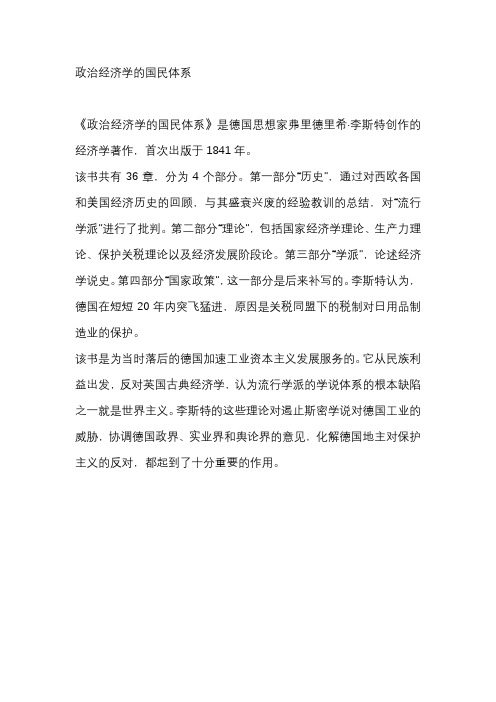
政治经济学的国民体系
《政治经济学的国民体系》是德国思想家弗里德里希·李斯特创作的经济学著作,首次出版于1841年。
该书共有36章,分为4个部分。
第一部分“历史”,通过对西欧各国和美国经济历史的回顾,与其盛衰兴废的经验教训的总结,对“流行学派”进行了批判。
第二部分“理论”,包括国家经济学理论、生产力理论、保护关税理论以及经济发展阶段论。
第三部分“学派”,论述经济学说史。
第四部分“国家政策”,这一部分是后来补写的。
李斯特认为,德国在短短20年内突飞猛进,原因是关税同盟下的税制对日用品制造业的保护。
该书是为当时落后的德国加速工业资本主义发展服务的。
它从民族利益出发,反对英国古典经济学,认为流行学派的学说体系的根本缺陷之一就是世界主义。
李斯特的这些理论对遏止斯密学说对德国工业的威胁,协调德国政界、实业界和舆论界的意见,化解德国地主对保护主义的反对,都起到了十分重要的作用。
《政治经济学的国民体系》读书笔记
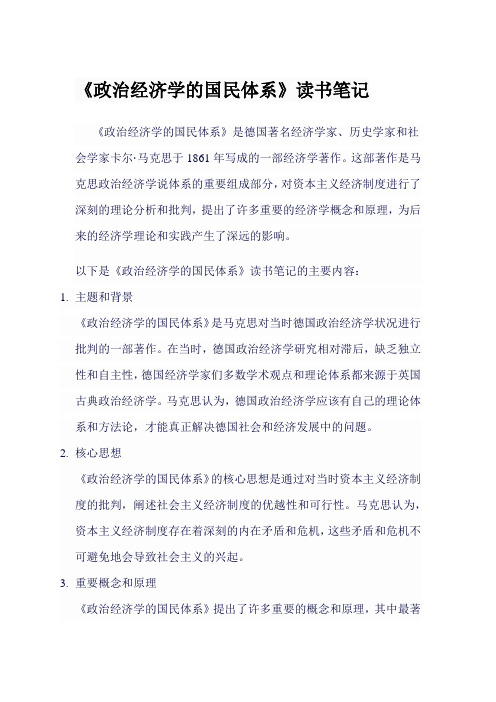
《政治经济学的国民体系》读书笔记《政治经济学的国民体系》是德国著名经济学家、历史学家和社会学家卡尔·马克思于1861年写成的一部经济学著作。
这部著作是马克思政治经济学说体系的重要组成部分,对资本主义经济制度进行了深刻的理论分析和批判,提出了许多重要的经济学概念和原理,为后来的经济学理论和实践产生了深远的影响。
以下是《政治经济学的国民体系》读书笔记的主要内容:1.主题和背景《政治经济学的国民体系》是马克思对当时德国政治经济学状况进行批判的一部著作。
在当时,德国政治经济学研究相对滞后,缺乏独立性和自主性,德国经济学家们多数学术观点和理论体系都来源于英国古典政治经济学。
马克思认为,德国政治经济学应该有自己的理论体系和方法论,才能真正解决德国社会和经济发展中的问题。
2.核心思想《政治经济学的国民体系》的核心思想是通过对当时资本主义经济制度的批判,阐述社会主义经济制度的优越性和可行性。
马克思认为,资本主义经济制度存在着深刻的内在矛盾和危机,这些矛盾和危机不可避免地会导致社会主义的兴起。
3.重要概念和原理《政治经济学的国民体系》提出了许多重要的概念和原理,其中最著名的是“剩余价值理论”和“资本积累理论”。
剩余价值理论揭示了资本主义生产方式的本质,即资本家通过剥削工人的剩余价值来获取利润。
资本积累理论则阐述了资本主义经济扩张的内在机制和危机爆发的可能性。
4.对后世的影响《政治经济学的国民体系》对后来的经济学理论和实践产生了深远的影响。
它为后来的社会主义运动提供了坚实的理论基础,成为马克思主义经济学说的重要组成部分。
同时,这部著作也为后来的经济学研究提供了重要的思路和方法论指导,促进了现代经济学的形成和发展。
5.结论《政治经济学的国民体系》是马克思政治经济学说体系中的重要著作之一,通过对资本主义经济制度的批判,阐述了社会主义经济制度的优越性和可行性。
这部著作对后来的经济学理论和实践产生了深远的影响,是马克思主义经济学说中的重要经典之一。
政治经济学的国民体系的读后感
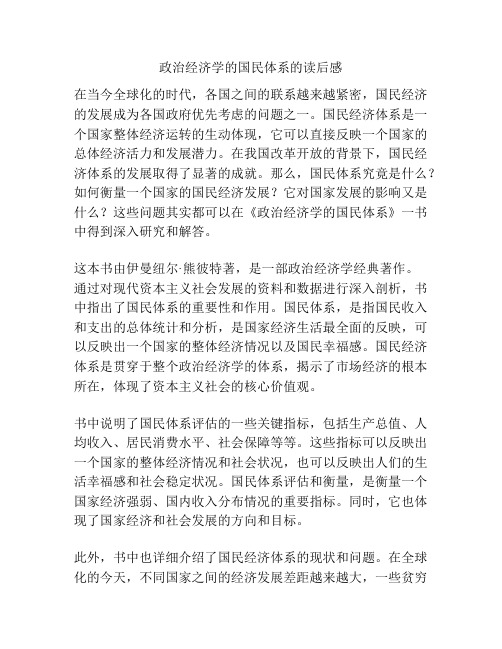
政治经济学的国民体系的读后感在当今全球化的时代,各国之间的联系越来越紧密,国民经济的发展成为各国政府优先考虑的问题之一。
国民经济体系是一个国家整体经济运转的生动体现,它可以直接反映一个国家的总体经济活力和发展潜力。
在我国改革开放的背景下,国民经济体系的发展取得了显著的成就。
那么,国民体系究竟是什么?如何衡量一个国家的国民经济发展?它对国家发展的影响又是什么?这些问题其实都可以在《政治经济学的国民体系》一书中得到深入研究和解答。
这本书由伊曼纽尔·熊彼特著,是一部政治经济学经典著作。
通过对现代资本主义社会发展的资料和数据进行深入剖析,书中指出了国民体系的重要性和作用。
国民体系,是指国民收入和支出的总体统计和分析,是国家经济生活最全面的反映,可以反映出一个国家的整体经济情况以及国民幸福感。
国民经济体系是贯穿于整个政治经济学的体系,揭示了市场经济的根本所在,体现了资本主义社会的核心价值观。
书中说明了国民体系评估的一些关键指标,包括生产总值、人均收入、居民消费水平、社会保障等等。
这些指标可以反映出一个国家的整体经济情况和社会状况,也可以反映出人们的生活幸福感和社会稳定状况。
国民体系评估和衡量,是衡量一个国家经济强弱、国内收入分布情况的重要指标。
同时,它也体现了国家经济和社会发展的方向和目标。
此外,书中也详细介绍了国民经济体系的现状和问题。
在全球化的今天,不同国家之间的经济发展差距越来越大,一些贫穷发展中国家存在着经济发展滞后、资源浪费、贫富差距扩大的问题。
这些问题严重影响了这些国家的社会稳定和政治稳定。
而在像中国这样的发展中国家,国民经济体系有着经济、政治、文化等多方面的问题。
例如财富分配不均、投资主体的集中度不高、金融市场的不完善等等,这些问题严重影响了中国经济的可持续发展,也严重影响了中国走向强国的进程。
正如书中所提到的,如何建立并健全国民体系、如何衡量一个国家的发展、如何促进社会的稳定和和谐永远是重要的话题。
世界近代史知到章节答案智慧树2023年上海大学
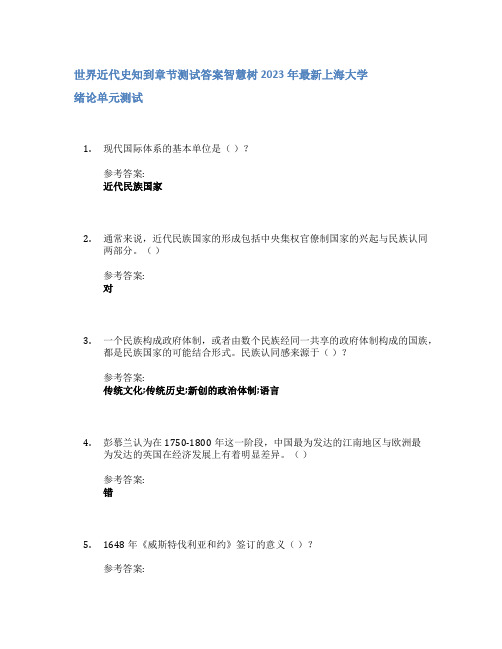
世界近代史知到章节测试答案智慧树2023年最新上海大学绪论单元测试1.现代国际体系的基本单位是()?参考答案:近代民族国家2.通常来说,近代民族国家的形成包括中央集权官僚制国家的兴起与民族认同两部分。
()参考答案:对3.一个民族构成政府体制,或者由数个民族经同一共享的政府体制构成的国族,都是民族国家的可能结合形式。
民族认同感来源于()?参考答案:传统文化;传统历史;新创的政治体制;语言4.彭慕兰认为在1750-1800年这一阶段,中国最为发达的江南地区与欧洲最为发达的英国在经济发展上有着明显差异。
()参考答案:错5.1648年《威斯特伐利亚和约》签订的意义()?参考答案:标志着第一个近代意义上的国际体系的建立;形成了国际社会的雏形;承认了民族国家自决的原则;形成了国际政治的雏形6.以下哪本近代经济学著作是深入考察了近代民族经济的重要资料()。
参考答案:弗里德里希·李斯特的《政治经济学国民体系》7.近代民族经济体经济的增长包括哪些方面()。
参考答案:工业化;相对稳定的经济增长;城市化8.韦伯认为,资本主义的发展与什么有密切的关联()?参考答案:欧洲的新教教义9.最早走向现代化的国家是()?参考答案:英国10.修昔底德认为,当一个崛起的大国与既有的统治霸主竞争时,双方面临的危险多数以战争告终。
()参考答案:对第一章测试1.“黄金是一切商品中最宝贵的东西,黄金是财富,谁占有了黄金谁就能获得他在世上所需要的一切,同时也就取得把灵魂从炼狱中拯救出来,并使灵魂重享天堂之乐的手段。
”此段话出自马可·波罗的《马可·波罗游记》。
()参考答案:错2.地理大发现的出现得益于欧洲航海技术的改进,其中中国发明的()由阿拉伯人传入欧洲后得到了广泛应用。
参考答案:罗盘3.下列文艺复兴时期的艺术家、人文主义作家与其代表性作品对应正确是()。
参考答案:米开朗其罗—《创世纪》;塞万提斯—《堂吉诃德》;达芬奇—《最后的晚餐》4.文艺复兴时期,()学科的革命成为近代自然科学开端的标志。
李斯特《政治经济学的国民体系》评述
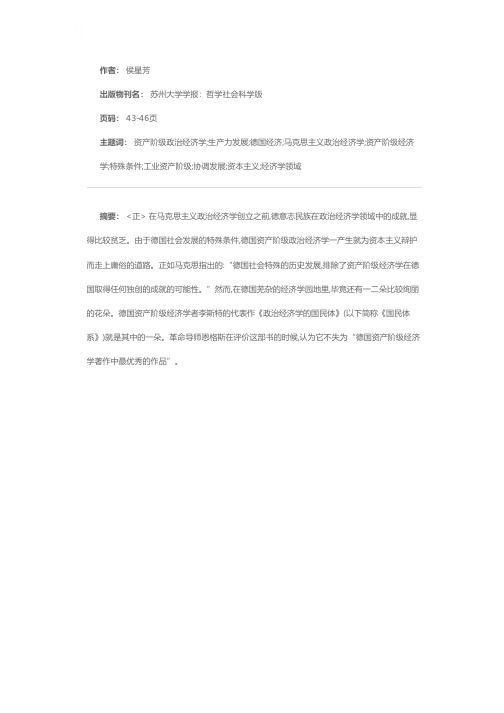
作者: 侯星芳
出版物刊名: 苏州大学学报:哲学社会科学版
页码: 43-46页
主题词: 资产阶级政治经济学;生产力发展;德国经济;马克思主义政治经济学;资产阶级经济学;特殊条件;工业资产阶级;协调发展;资本主义;经济学领域
摘要: <正> 在马克思主义政治经济学创立之前,德意志民族在政治经济学领域中的成就,显得比较贫乏。
由于德国社会发展的特殊条件,德国资产阶级政治经济学一产生就为资本主义辩护而走上庸俗的道路。
正如马克思指出的:“德国社会特殊的历史发展,排除了资产阶级经济学在德国取得任何独创的成就的可能性。
”然而,在德国芜杂的经济学园地里,毕竟还有一二朵比较绚丽的花朵。
德国资产阶级经济学者李斯特的代表作《政治经济学的国民体》(以下简称《国民体系》)就是其中的一朵。
革命导师恩格斯在评价这部书的时候,认为它不失为“德国资产阶级经济学著作中最优秀的作品”。
幼稚产业保护论的思想集中反映在李斯特1841年出版的[宝典]
![幼稚产业保护论的思想集中反映在李斯特1841年出版的[宝典]](https://img.taocdn.com/s3/m/13661d1603020740be1e650e52ea551810a6c90a.png)
幼稚产业保护论的思想集中反映在李斯特1841年出版的《政治经济学的国民体系》一书中,核心思想如下:(一)经济发展阶段论李斯特将一国经济发展的历程分为五个阶段:原始未开化阶段、畜牧阶段、农业阶段、农工业阶段、农工商业阶段。
他认为,在不同的经济发展阶段应采用不同的贸易政策,自由贸易并不适用于每个经济发展阶段。
在农工业阶段的国家应采用保护主义的贸易政策,原因是此时本国工业虽有所发展,但发展程度低,国际竞争力差,不足以与来自处于农工商业阶段国家的产品相竞争。
如若采用自由贸易政策,不但享受不到贸易利益,还会令经济遭受巨大冲击。
(二)生产力论不管是亚当·斯密的绝对优势说还是大卫·李嘉图的比较成本说,都显示了明显的贸易利益。
对此,李斯特认为,自由贸易固然有益,但这样的贸易利益不足以作为贸易自由化的依据。
原因是,自由贸易理论是基于静态分析方法和世界主义的立场之上,这与现实世界不符。
这样的贸易利益应被视为静态的贸易利益,按照比较优势进行贸易,尽管在短期落后国家能够获得一些贸易利益,但从长远来看,该国生产财富的能力却不能得到应有的发展。
任何时候,各民族的利益都高于一切。
当自由贸易损害到一国实际或潜在利益的时候,该国有权考虑自己的经济利益。
在经济发展的过程中,比较优势是动态且可培养的。
落后的国家在面临发达国家强有力的竞争时,为了“促进生产力的成长”,有理由采取产业保护措施。
针对当时的经济背景,李斯特指出,对于德、美这样的处于农工业阶段的国家如果与处于农工商业阶段的英国进行自由贸易,虽然表面上在短期能够获得贸易利益,但在长期将损害其生产力,制约其创造财富的能力。
一个国家要追求的是财富的生产力,而非仅仅是财富本身。
“财富的生产力比之财富本身,不晓得要重要多少倍;它不但可以使已有和已经创造的财富获得保障,而且可以使已经消灭的财富获得补偿。
”(三)国家干预论像重商主义一样,幼稚产业保护理论也强调国家在贸易保护中的重要作用。
大国抱负与赶超进程中的产业政策——写在李斯特《政治经济学的国民体系》出版180周年
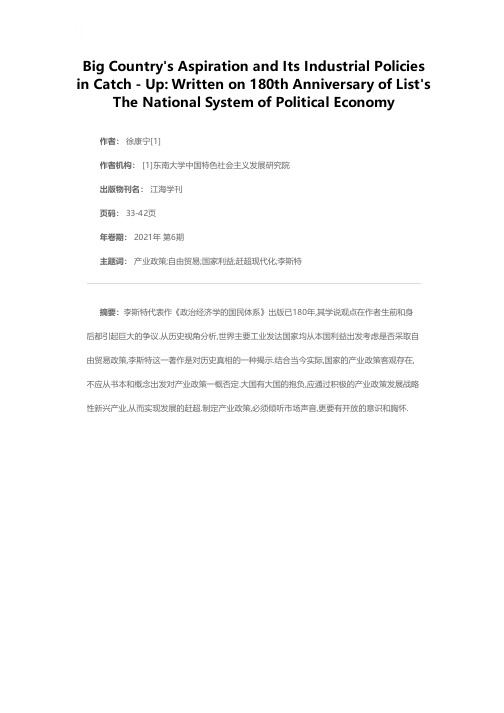
Big Country's Aspiration and Its Industrial Policies in Catch - Up: Written on 180th Anniversary of List's The National System of Political Economy 作者: 徐康宁[1]
作者机构: [1]东南大学中国特色社会主义发展研究院
出版物刊名: 江海学刊
页码: 33-42页
年卷期: 2021年 第6期
主题词: 产业政策;自由贸易;国家利益;赶超现代化;李斯特
摘要:李斯特代表作《政治经济学的国民体系》出版已180年,其学说观点在作者生前和身
后都引起巨大的争议.从历史视角分析,世界主要工业发达国家均从本国利益出发考虑是否采取自由贸易政策,李斯特这一著作是对历史真相的一种揭示.结合当今实际,国家的产业政策客观存在,
不应从书本和概念出发对产业政策一概否定.大国有大国的抱负,应通过积极的产业政策发展战略性新兴产业,从而实现发展的赶超.制定产业政策,必须倾听市场声音,更要有开放的意识和胸怀.。
- 1、下载文档前请自行甄别文档内容的完整性,平台不提供额外的编辑、内容补充、找答案等附加服务。
- 2、"仅部分预览"的文档,不可在线预览部分如存在完整性等问题,可反馈申请退款(可完整预览的文档不适用该条件!)。
- 3、如文档侵犯您的权益,请联系客服反馈,我们会尽快为您处理(人工客服工作时间:9:00-18:30)。
李斯特著作的时代背景拿破仑战争以后,德国的邦数已由300个减少到38个,但是各邦有自己的关税壁垒。
这种情况大大妨碍了商品流通的发展和全国市场的形成。
为了消除这种阻碍,德国资产阶级在1834年成立了统一的关税同盟,除了奥地利和一些小邦,其他各邦都参加了。
大工业特别是纺织工业获得了比较迅速的发展,可是国内政治上的统一还没有完成,工业的发展还远远地落后于英国和法国。
当时英国已经实现了高度的工业化,法国的工业也有很大的发展,它们竭力提倡在国际市场上开展自由竞争,以大量廉价的商品冲击德国的市场。
怎样摆脱外国自由竞争的威胁,促进德国大工业的发展,成为德国资产阶级的迫切要求。
而产业革命以后英法工业生产技术大大提高,国内市场已不能满足资本主义生产发展的需要,同时资产阶级也有了充分的力量在国际市场上开展自由竞争,因此他们竭力倡导自由贸易。
在这时德国的工业技术却落后得多,资产阶级面对着先进的资本主义国家的竞争,比工业发展初期的英法更加需要保护关税制度,因为这样,以李斯特为代表的德国资产阶级也就特别强调国家的干预作用。
FRIEDRICH LIST,THE NATIONAL SYSTEM OF POLITICAL ECONOMY (1841) Second Book The Theory Chapter XIPolitical and Cosmopolitical Economy.Before Quesnay and the French economists there existed only a practice of political economy which was exercised by the State officials, administrators, and authors who wrote about matters of administration, occupied themselves exclusively with the agriculture, manufactures, commerce, and navigation of those countries to which they belonged, without analysing the causes of wealth, or taking at all into consideration the interests of the whole human race.Quesnay (from whom the idea of universal free trade originated) was the first who extended his investigations to the whole human race, without taking into consideration the idea of the nation. He calls his work 'Physiocratie, ou du Gouvernement le plus avantageux au Genre Humain,' his demands being that we must imagine that the merchants of all nations formed one commercial republic. Quesnay undoubtedly speaks of cosmopolitical economy, i.e. of that science which teaches how the entire human race may attain prosperity; in opposition to political economy, or that science which limits its teaching to the inquiry how a given nation can obtain (under the existing conditions of the world) prosperity, civilisation, and power, by means of agriculture, industry, and commerce.Adam Smith treats his doctrine in a similarly extended sense, by making it his task to indicate the cosmopolitical idea of the absolute freedom of the commerce of the whole world in spite of the gross mistakes made by the physiocrates against the very nature of things and against logic. Adam Smith concerned himself as little as Quesnay did with true political economy, i.e. that policy which each separate nation had to obey in order to make progress in its economical conditions. He entitles his work, 'The Nature and Causes of the Wealth of Nations' (i.e. of all nations of the whole human race). He speaks of the various systems of political economy in a separate part of his work solely for the purpose of demonstrating their non-efficiency, and of proving that 'political' or national economy must be replaced by 'cosmopolitical or world-wide economy.' Although here and there he speaks of wars, this only occurs incidentally. The idea of a perpetual state of peace forms the foundation of all his arguments. Moreover, according to the explicit remarks of his biographer, Dugald Stewart, his investigations from the commencement are based upon the principle that 'most of the State regulations for the promotion of public prosperity are unnecessary, and a nation in order to be transformed from the lowest state of barbarism into a state of the highest possible prosperity needs nothing but bearable taxation, fair administration of justice, and peace.' Adam Smith naturally understood under the word 'peace' the 'perpetual universal peace' of the Abbe de Pierre.······The Britons as an independent and separate nation would henceforth take their national interest as the sole guide of their policy. The Englishman, from predilection for his language, for his laws, regulations, and habits, would whenever it was possible devote his powers and his capital to develop his own native industry, for which the system of free trade, by extending the market for English manufactures over all countries, would offer him sufficient opportunity; he would not readily take a fancy to establish manufactures in France or Germany. All excess of capital in England would be at once devoted to trading with foreign parts of the world. If the Englishman took it into his head to emigrate, or to invest his capital elsewhere than in England, he would as he now does prefer those more distant countries where he would find already existing his language, his laws, and regulations, rather than the benighted countries of the Continent. All England would thus be developed into one immense manufacturing city. Asia, Africa, and Australia would be civilised by England, and covered with new states modelled after the English fashion. In time a world of English states would be formed, under the presidency of the mother state, in which the European Continental nations would be lost as unimportant, unproductive races. By this arrangement it would fall to the lot of France, together with Spain and Portugal, to supply this English world with the choicest wines, and to drink the bad ones herself: at most France might retain the manufacture of a little millinery. Germany would scarcely have more to supply this English world with than children's toys, wooden clocks, and philological writings, and sometimes also an auxiliary corps, who might sacrifice themselves to pine away in the deserts of Asia or Africa, for the sake of extending the manufacturing and commercial supremacy, the literature and language of England. Itwould not require many centuries before people in this English world would think and speak of the Germans and French in the same tone as we speak at present of the Asiatic nations.True political science, however, regards such a result of universal free trade as a very unnatural one; it will argue that had universal free trade been introduced at the time of the Hanseatic League, the German nationality instead of the English would have secured an advance in commerce and manufacture over all other countries.It would be most unjust, even on cosmopolitical grounds, now to resign to the English all the wealth and power of the earth, merely because by them the political system of commerce was first established and the cosmopolitical principle for the most part ignored. In order to allow freedom of trade to operate naturally, the less advanced nations must first be raised by artificial measures to that stage of cultivation to which the English nation has been artificially elevated. In order that, through that cosmopolitical tendency of the powers of production to which we have alluded, the more distant parts of the world may not be benefited and enriched before the neighbouring European countries, those nations which feel themselves to be capable, owing to their moral, intellectual, social, and political circumstances, of developing a manufacturing power of their own must adopt the system of protection as the most effectual means for this purpose. The effects of this system for the purpose in view are of two kinds: in the first place, by gradually excluding foreign manufactured articles from our markets, a surplus would be occasioned in foreign nations, of workmen, talents, and capital, which must seek employment abroad; and secondly, by the premium which our system of protection would offer to the immigration into our country of workmen, talents, and capital, that excess of productive power would be induced to find employment with us, instead of emigrating to distant parts of the world and to colonies. Political science refers to history, and inquires whether England has not in former times drawn from Germany, Italy, Holland, France, Spain, and Portugal by these means a mass of productive power. She asks: Why does the cosmopolitical school, when it pretends to weigh in the balance the advantages and the disadvantages of the system of protection, utterly ignore this great and remarkable instance of the results of that system?。
